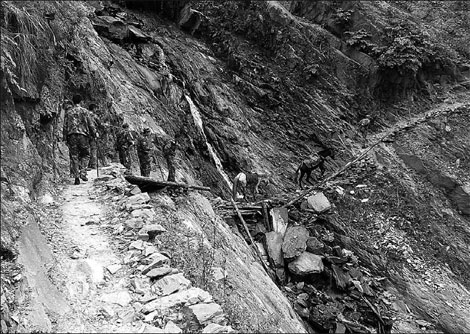A unique calling
Updated: 2012-07-13 13:31
By Zhang Yue (China Daily)
|
|||||||||||
 |
|
Doctors from No 115 Hospital of the PLA are on their way to medical visits in Medog county. Provided to China Daily |
Some 40 doctors have been traveling to Medog county, one of the world's most remote areas, to provide medical assistance. Zhang Yue reports in Beijing.
For the past 18 years, 40 doctors from Nyingchi county, Tibet autonomous region, have given medical care to one of the world's most remote areas.
The area is Medog county in Tibet, some 220 kilometers from Nyingchi county.
The doctors from the No 115 Hospital of the People's Liberation Army began their involvement in 1994, after a boy was sent to the hospital because of severe abdominal pain.
Doctors tried their best but the boy died because it took him five days and nights to get to the hospital, as there was no proper access road from Medog to Nyingchi.
The incident was a wake-up call for the hospital, which decided to send regular medical help to Medog.
Life in the remote area has been a constant battle for the more than 10,000 people from the Monba and Tibetan ethnic groups. Natural disasters, such as landslides, earthquakes and floods, frequently occur. Children die from diseases, such as flu, and even relatively minor injuries can lead to severe problems.
Doctors from No 115 Hospital of the People's Liberation Army decided to assist the county, especially during winter when heavy snowfall would completely cut it off from the outside world. They would normally stay from November until the following spring.
"Some of us joked that we go to Medog to hibernate like animals," says Ye Dongping, associate chief surgeon of the hospital who led a group of doctors to Medog in 1999. He was 28.
"The road to Medog was a disaster - a nightmare," says Ye. "But what's more heart-wrenching was to see the poor medical conditions there."
He said he went to Medog with open eyes. "I was young, with perfect health, and eager to see one of the hardest parts of the world and to help people there."
Ye recalled the arduous journey. With his colleagues, he hiked for two days and nights without rest and risked being hit by falling rocks, landslides and snowstorms, as well as attacked by snakes or getting leeches.
And because there was no proper road, the doctors were on foot for more than half the journey.
"The road was tougher than anything we see in the movies. My feet could hardly touch the ground, as my toenails have completely fallen off because of too much walking. We were in constant fear of natural disasters and attacks by animals. When we arrived at Medog, I had 27 leeches on my body."
Ye says during the trip, he desperately wanted to stop for a rest but was advised to stay close to the group. He was warned that he might get lost like a woman journalist did in 1994. They later found her buried in ice.
Looking at the conditions in Medog upon arrival, Ye and his team knew that they have made the right decision because the county needed them.
The county lies in the subtropical climate on the China-India border, where such diseases as type B encephalitis, malaria and scabies are very common.
"The locals don't have much medical knowledge," says Feng Guojun, another doctor from the hospital, who served in Medog in 2007. He is now the hospital's head.
During his first month in Medog, a 3-year-old boy sought medical treatment because of third-degree burn. What shocked the doctor is that his parent had used dust to cover the kid's wound, thinking that it would help.
Some turn to prayers when they fell ill.
Ye says that during his eight months in Medog, he suffered from eczema and influenza because of the harsh climate.
Making medical visits was sometimes a terrifying experience. He recalls using a rope to swing across a valley.
"I was scared to death," Ye says, even though it has been over a decade since his visit to Medog. "We had no choice when lives are at stake on the other side of the mountain. There were cases of people who died because we did not arrive on time."
Despite the challenges, Ye says he has never regretted his decision to volunteer in Medog. Over the years, doctors from his hospital have conducted 7,200 surgeries and saved more than 800 lives.
The hospital in Medog county is now capable of handling minor surgeries - thanks to the knowledge transfer by the PLA doctors.
But, although Medog is now connected with a road from Nyingchi, it's not all smooth sailing. Frequent landslides and snowstorms still sometimes prevent people from getting in and out of the county.
Contact the writer at zhangyue@chinadaily.com.cn.
Related Stories
Devoted doctor 2012-07-11 10:41
Nam Co Lake embraces tourism peak in Tibet 2012-07-10 10:43
Magnificent scenery in Tibet's Nagqu 2012-07-06 17:19
Man on a mission 2012-06-26 09:51
Chinese Medicated Cuisines 2012-05-16 17:52
Today's Top News
Rescuers race against time for quake victims
Telecom workers restore links
Coal mine blast kills 18 in Jilin
Intl scholarship puts China on the map
More bird flu patients discharged
Gold loses sheen, but still a safe bet
US 'turns blind eye to human rights'
Telecom workers restore links
Hot Topics
Lunar probe , China growth forecasts, Emission rules get tougher, China seen through 'colored lens', International board,
Editor's Picks

|

|

|

|

|

|





